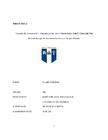| dc.description.abstract | This thesis provides a comparative and contrastive perspective on the works of James Joyce, Sean O‘Casey and Paul Howard, with particular thematic focus on their portrayals of Dublin. Joyce provided a vision of Dublin in the early 1900s, as a modern metropolis which was, for him, a center of paralysis. O‘Casey put on stage the tenement life of the mid-1900s while Howard depicted contemporary upper-middle class Dublin society. The three writers used very specific forms of language, with Joyce capturing the middle class dialect, O‘Casey depicting the ordinary working classes tenement life and Howard portraying the twentieth first century upper-middle class spoken idiom. I will examine specific contextual aspects of the works of this Dublin trio in terms of their shared but different articulation of a Dubliner. In addition to this the thesis is theoretically-driven by Derrida‘s concept of hierarchical oppositions, and by how the history of Western discourse has been based upon that of binary logic, which can be dismantled through a close reading practice which deconstructs these binaries by looking for irruptive elements of the text which can then produce what Derrida sees as ‗undecidables‘.
Hence the argument of this thesis is to analysis three major binaries, namely high/popular literature, speech/writing, and maleness/femaleness through the texts of Joyce, O‘Casey and Howard in order to display how binary logic can be dismantled to the point of undecidability in each case. I argue that each of these writers exerts a destabilizing effect upon the notion that binaries are arranged into a violent hierarchy and will demonstrate that, when dismantled, the binary elements are interdependent as opposed to mutually oppositional. Hence I am referring to an order that is lacking structure by introducing Derrida‘s notion of ‗undecidability‘. I aim to prove that there is not a bond of purity attached to either half of the hierarchical opposition, and that their inherent asymmetrical value-systems are not givens, but rather constructs, which can, in turn, be deconstructed and I will analyse how each of these writers liberate such notions of undecidability in their work. | en |


